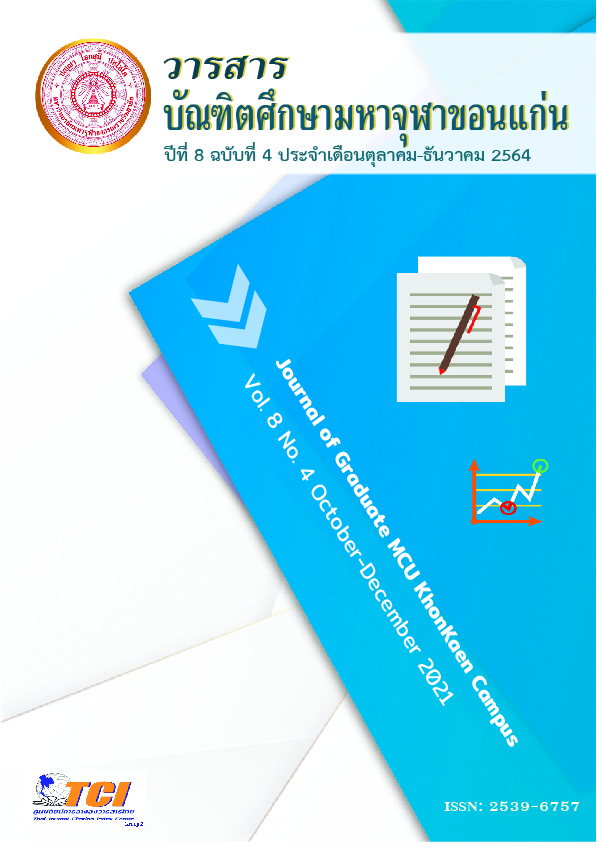THE DEVELOPMENT OF A STRESS MANAGEMENT PROGRAM BASED ON BUDDHIST ETHICS FOR PARENTS OF CRITICALLY ILL CHILDREN IN KHON KAEN HOSPITAL
Main Article Content
Abstract
This action research aimed to 1) study the stress management problems of the parents of children with pediatric critical illnesses, 2) develop the stress management program based on Buddhist ethics and 3) study the results of the stress management program based on Buddhist ethics. The samples consisted of 15 registered nurses and 62 parents of children with pediatric critical illnesses. Data were collected by using a
stress management interview form, a stress self-assessment form and a questionnaire on stress management. Data were analyzed by content analysis, frequency distribution, percentage and mean.
The differences of the mean stress scores and stress management approaches after using the program were compared by t-test.
The results were as follows.
1. In terms of the stress management problem, it was found that most of the parents used the emotional focused coping approach, but the problem focused coping approach was least used.
2. The principles of mindfulness in accordance with the principle of Satipatthana 4, the 4 Noble Truths and the Trinity Principle were adopted to develop the stress management program according to Buddhist ethics, consisting of 5 activities: 1) open mind to learn new things, 2) be aware and calm, 3) face the truth and learn to change, 4) live with causes and effects, understand and correct them, and 5) make conclusion.
3. For the results of the stress management program based on Buddhist ethics, after using the program, the mean stress scores of the group using the program (Mean=1.08, SD=1.62) were lower than those of the group that did not use the program (Mean=2.27, SD=0.08) with statistical significance (t=31.54, p<0.05). The mean scores on stress man agement of the group using the program (Mean=4.31, SD=0.06) were higher than those of the group that did not use the program (Mean=3.47, SD=0.08) with statistical significance
(t=37.67, p<0.05).
Article Details
References
เกศรา และคณะ. (2550). ปัจจัยทำนายความเครียดและการจัดหารความเครียดของบิดามารดาผู้ป่วยเด็กภาวะวิกฤตที่รับการรักษาในหออภิบาลผู้ป่วยเด็กหนัก. สงขลา: มหาวิทยาลัยสงขลานครินทร์.
ชนิกา ภูวดิษยคุณ. (2554). การประยุกต์หลักพุทธธรรมเพื่อการบริหารความเครียดในองค์กร. ใน วิทยานิพนธ์ปริญญาพุทธศาสตรมหาบัณฑิต. พระนครศรีอยุธยา: มหาวิทยาลัยมหาจุฬาลงกรณราชวิทยาลัย.
พรศิริ ใจสม. (2536). ความเครียดและวิธีการเผชิญความเครียดของบิดามารดาที่บุตรเข้ารับการรักษาในหอผู้ป่วยกุมารเวชกรรม. ใน วิทยานิพนธ์พยาบาลศาสตรมหาบัณฑิต สาขาการพยาบาลแม่และเด็ก. เชียงใหม่: มหาวิทยาลัยเชียงใหม่.
พระครูปลัดไพรัช จนฺทสโร. (2561). การแก้ปัญหาโรคความเครียดด้วยพุทธปรัชญาว่าด้วยมหาสติปัฏฐาน 4. วารสารมหาจุฬานาครทรรศน์, 5(2), 377-393.
พระพรหมคุณาภรณ์ (ป.อ. ปยุตฺโต). (2556). พุทธธรรมฉบับปรับขยาย. (พิมพ์ครั้งที่ 38). กรุงเทพมหานคร: สำนักพิมพ์ผลิธัมม์.
พระมหามนตรี หลินภู. (2551). การศึกษาความเครียดและการลดความเครียดในการใช้ชีวิตภายในเรือนจำของผู้ต้องขังโดยการให้คำปรึกษาแบบกลุ่มโดยยึดหลักอริยสัจ 4. ใน วิทยานิพนธ์ สาขาจิตวิทยาการแนะแนว. มหาวิทยาลัยศรีนครินทรวิโรฒ.
พระอนุพงษ์ พรมสะอาด. (2551). การประยุกต์ใช้อริยสัจสี่ในการจัดการความเครียด. ในวิทยานิพนธ์ศึกษาศาสตรมหาบัณฑิต สาขาวิชาการส่งเสริมสุขภาพ. เชียงใหม่: มหาวิทยาลัยเชียงใหม่.
ภัทรภรณ์ วงษกรณ์. (2560). ผลของโปรแกรมการฝึกความเครียดในผู้ต้องขัง. ในวิทยานิพนธ์พยาบาลศาสตรมหาบัณฑิต สาขาการพยาบาลจิตเวชและสุขภาพจิต. มหาวิทยาลัยธรรมศาสตร์.
รัตนะ บัวสนธ์. (2556). การวิจัยและพัฒนานวัตกรรมการศึกษา. พิษณุโลก: บั๊วกราฟฟิค.
สุพิศ สุขประเสริฐ. (2556). การประยุกต์ใช้หลักพุทธธรรมในการแก้ปัญหาความเครียดของบุคคลวัยทอง. ใน วิทยานิพนธ์ปริญญาพุทธศาสตรมหาบัณฑิต สาขาวิชาพระพุทธศาสนา (ภาคพิเศษ). มหาวิทยาลัยมหาจุฬาลงกรณราชวิทยาลัย วิทยาเขตนครราชสีมา.
Aldridge, M.D. (2005). Decreased parental stress in the pediatric intensive care unit. Crit Care Nurs. 25(6), 40-50.
Cohen J. (1992). A power primer. Psychological Bulletin, 112, 115-159.
Deatrick, J. Clarifying the concept of normalization. Image, 31(2), 209 – 214.
Kemmis S., & McTaggart, R. (1990). The action research planner. Geelong: Deakin University Press.
Lazarus, R.S., & Folkman, S. (1984). Stress appraisal and coping. New York: Springer.
Melnyk, B.M. (2000). Intervention studies involving parents of hospitalized young children: An analysis of the past and future recommendations. J Pediatr Nurs, 15(1), 4-13.
Smith, A.B et.al. Parent bed spaces in the PICU: Effect on parental stress. Pediatr Nurs, 33(3), 215-21.

